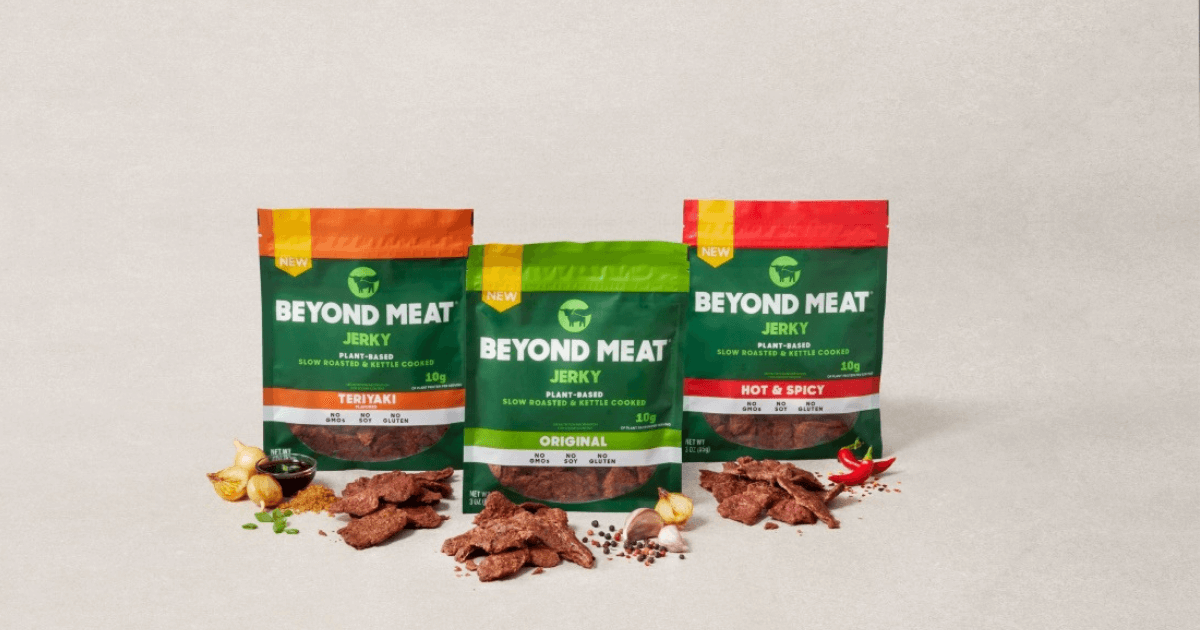Plant-Based Food Brands Develop a Taste for Licensing

In an effort to expand, plant-based foods are developing an appetite for licensing.
The Planet Partnership joint venture between PepsiCo and Beyond Meat, for one, recently launched pea- and mung bean-based teriyaki jerky that capped more than two years of development. The product marked Beyond Meat’s first shelf-stable product and is a further expansion of Pepsi’s Frito-Lay division. The offering also brought plant-based brand licensing to retail.
Up until now, as plant-based food sales grew, the initial route for licensing was through quick-serve restaurants (QSR). These deals include restaurants’ purchase of plant-based burgers (Impossible Foods-Burger King and Beyond Meat-McDonald’s) or chicken (Beyond Meat-Kentucky Fried Chicken), as well as the licensing of brands for marketing promotion and menu placement. Many of these agreements are for limited-time offers.
The recent focus on retail comes as the plant-based food market’s sales growth showed signs of slowing in 2021. Beyond Meat’s annual revenue increase narrowed to 14% last year ($465 million) from 37% the year before, but declined 1.2% in the fourth quarter specifically ($100.7 million).
The category’s overall U.S. revenue rose 6% to $7.4 billion in 2021. Plant-based milk led the way in dollar sales, accounting for 16% of the entire milk category. Retail sales of plant-based meat declined 0.4% (versus 45% growth in 2020) and now represent 1.4% of the total meat category. Yet brand awareness remained high, with Beyond Meat being recognized by 65% of consumers in surveys, up from 34% a year earlier, CEO Ethan Brown said.
“We do not expect certain trends that appear [to be] related to Covid—and that did not favor our category—to persist,” Brown said. “Chief among these trends was a diminished focus on health-oriented eating choices, with consumers opting instead for comfort foods and a reduced openness” to new plant-based foods.
With plant-based sales expected to regain some footing this year, new entrants are on the horizon. That’s despite price parity with standard foods not expected to be achieved until 2025. But within 20 years, plant-based foods will account for around 25% of U.S. meat consumption, said David Zilko, who is launching the plant-based Skinny Butcher brand with chicken. As part of its marketing, Skinny Butcher’s branding will focus on a retro pop-art style butcher that can be modified for different products—picture a captain’s hat for seafood or a red and sweaty face for spicy items, Zilko said. The market had been slowly building – Chipolte Mexican Grille partnered with supplier Hobo Foods in 2014 to introduce soybean-based “lifestyle bowls’ — but accelerated with the addition of Beyond Meat, Impossible Foods and others.
Despite this focus on brand-building, plant-based offerings may not yet be ready for prime time when it comes to licensing, according to some agency executives.
“Most of these products right now are about growing their own brand name,” said Bill Cross, global senior VP of development at Broad Street Licensing Group. “So, extending into other categories is probably a little premature. The [PepsiCo-Beyond Meat] jerky is a natural fit because it is a meat extension, but I don’t think that you are going to see licensed TV dinners. The business is still in the process of shaking out and it’s a question of where this business is going to be in the long term. It’s definitely going to be part of the food mix, but whether it’s going to be part of licensing remains to be seen.”
Yet with plant-based products being more widely available at fast-food restaurants, consumers are becoming more familiar with them and are able to try them in a “low-stakes” setting, said Brand Central President Ross Misher, whose firm represents Kraft-Heinz, Mars Wrigley and other food brands. “They are about to test out a $4 burger instead of buying an entire pound and cooking a meal,” Misher said. “Consumers now know and recognize which plant-based brands are out there, and are more willing to try new brands as well. Many of the plant-based brands are ripe for brand extensions as they are becoming a more important part of our diet and lifestyle.”




